The Col du Granon marked the decisive moment in the race when Jonas Vingegaard attacked and Tadej Pogačar cracked. Jumbo-Visma used their collective force to dismantle the UAE team and pressure Pogačar into covering attacks and on the final climb Vingegaard was able to ride away, take time and race lead. This was the moment the race was won.
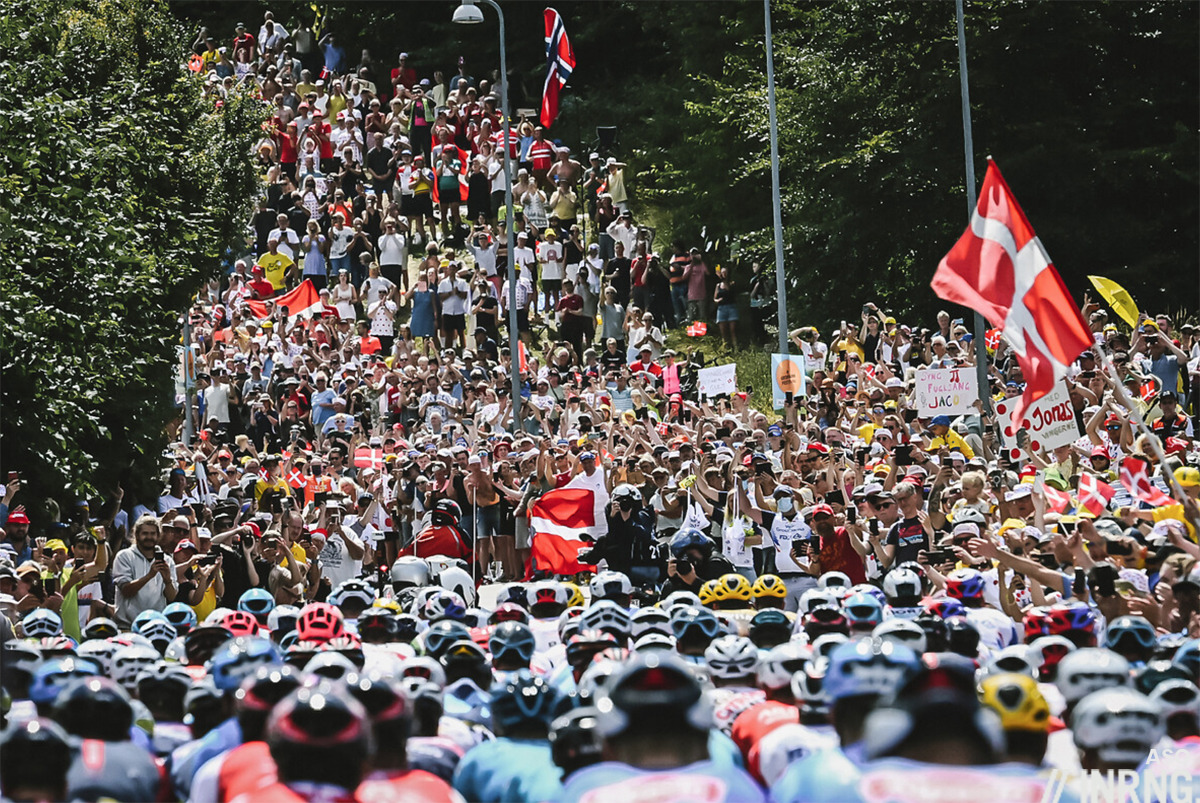
The race began in a downpour in Copenhagen and we got a surprise winner in Yves Lampaert. The days in Denmark were defined by the crowds roaring on Magnus Cort in his polka-dot quest while a stage win each for Fabio Jakobsen and Dylan Groenewegen supplied stories of redemption, although it seems there’s still litigation to come.
Wout van Aert had a Danish run of three second places and with this took the green jersey which he’d keep to Paris. Then he then won in Calais after going solo with a clifftop caper. The moment is worth recalling with our benefit of hindsight because when Jumbo-Visma launched up the final climb few could follow, only Ineos and Jumbo jerseys were visible and one of the last riders to stay with Van Aert was Vingegaard.
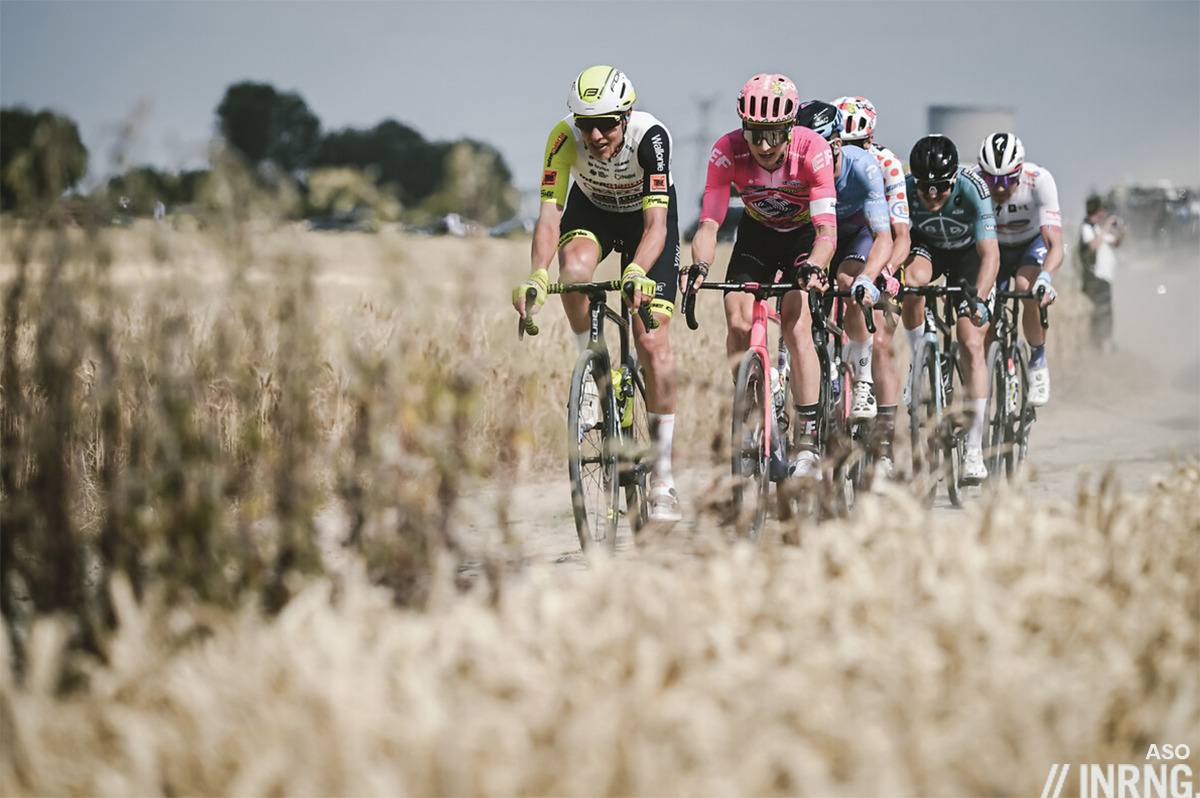
The pavé stage to Wallers-Arenberg was always going to be a nervous and dangerous day. The worst crashes actually happened on tarmac roads but the cobbles, and the fear of the cobbles, had made many nervous and tired. The breakaway stayed away for the day with Simon Clarke a surprise winner. Among the eventual top-10 on GC there were no time losses but there were mishaps and this was the day Vingegaard’s Tour was saved. He’d had a mechanical and after a comical series of bike changes which looked like an impromptu bike fitting session, Vingegaard gave chase with help from several team mates but others were further back and also helping Primoz Roglič who’d crashed. Huge turns from Van Aert helped Vingegaard twice over. First it got him back to the main group with his GC rivals; second, the Belgian kept on towing because Pogačar had attacked with Jasper Stuyven and at one point had a minute’s lead and was close to catching the breakaway but he was closed down. Jack Haig was a DNF and Ben O’Connor’s Tour was undone, both might wonder what could have been.
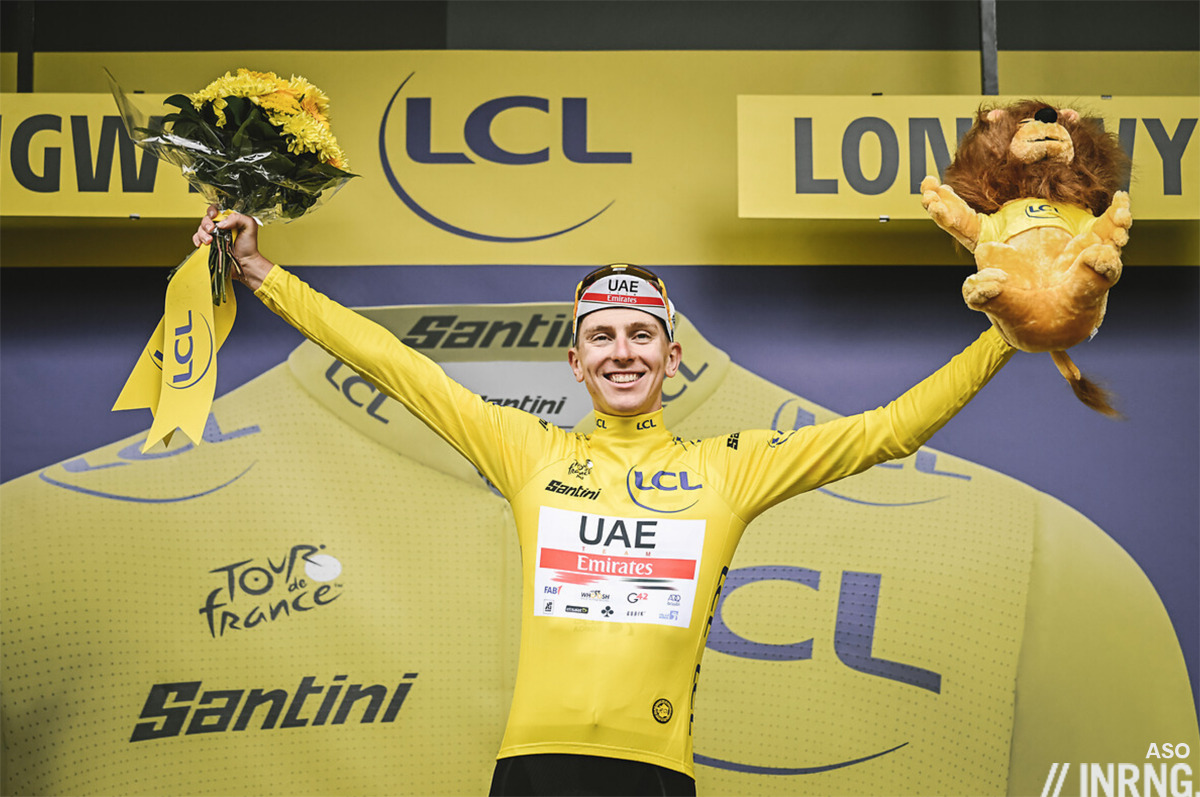
Up until then everything had been so easy for Pogačar. Last year’s Tour triumph by five minutes, a win in Lombardia. Untouchable in the UAE Tour at the start of the season. He almost won the Tour of Flanders and then even took to social media to troll about doing Paris-Roubaix. He emerged again at the Tour of Slovenia to win the race while gifting stage wins. He continued like this in the Tour de France, the best GC contender in the Copenhagen TT. His attack on the pavé had him riding away from his rivals, although this didn’t gain him any time. Instead he won the next day in Longwy to take the yellow jersey, and then won again the next day atop the Planche des Belles Filles. He kept at it, sprinting to the line in Lausanne only to lose out to van Aert for the stage win; sprinting to the line in Châtel the next day when there was no stage to win because Bob Jungels had won the day after a stage of stunning scenery.
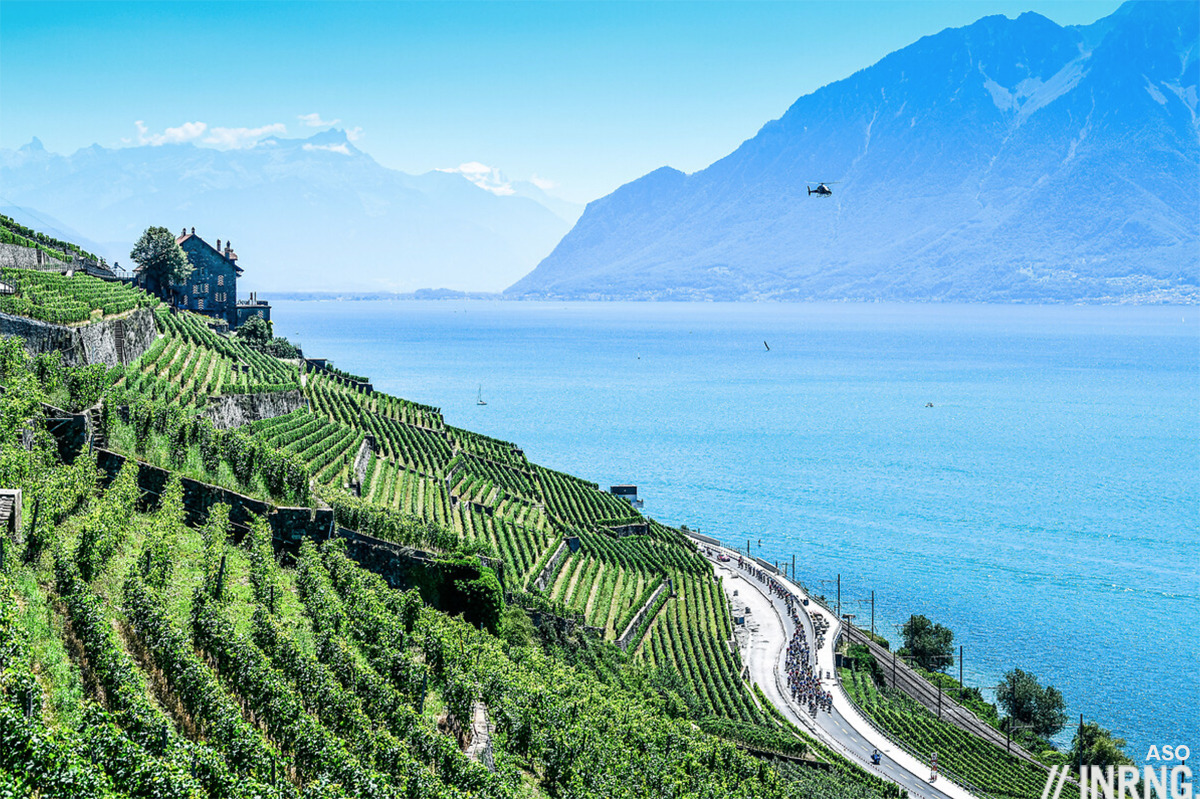
Then on the stage to Megève won by Magnus Cort Pogačar’s UAE team chased up the final climb which kept him yellow by 11 seconds, and he was 39 seconds up on Vingegaard, of which 21 seconds came from time bonuses. With hindsight this was all dandy but in a race that would be won by minutes, Pogačar and his team were toiling hard just to get seconds.
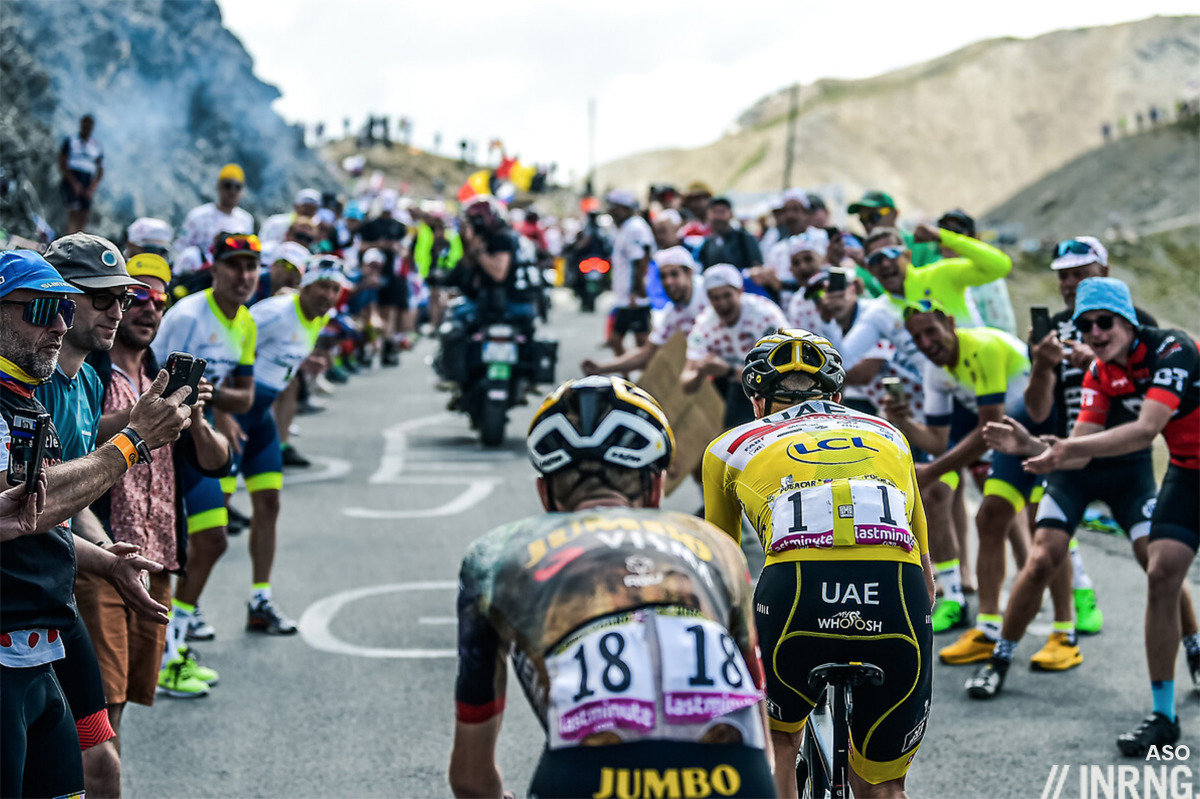
Stage 11 was the first big mountain stage and even if it was only 150km had the Télégraphe-Galibier combo and then the mighty Col du Granon, and all in roasting heat which was rumoured to be Pogačar’s weak point. Jumbo-Visma turned up the thermostat early when Wout van Aert attacked from the start with Mathieu van der Poel, the latter on a swansong after a disappointing first week.
Once the race reached the Col du Télégraphe Jumbo-Visma activated their plan with Benoot launching Roglič in an attack. Pogačar gave chase and by the Galibier he’d ran out of UAE team mates. Yet the higher they climbed, the more things began to level out with just Pogačar and Vingegaard left to duel until they were rejoined by more on the descent.
Onto the Granon for the first time since 1986, Nairo Quintana made his trademark slow-style attack, riding away only a fraction faster but gradually taking time. Romain Bardet next to move. It was open season. With 5km to go Vingegaard attacked. Rafał Majka gave chase for his leader but crucially Pogačar could not follow. In a flash Majka had vanished, Vingegaard was away and Pogačar losing ground, his yellow jersey flapping in the breeze as Geraint Thomas trundled past. He was soon overhauled by David Gaudu and then Adam Yates, this wasn’t a matter of being a few watts short, his lights had gone out. Vingegaard took the stage, the yellow jersey and 2m51 on Pogačar to turn the Tour upside down. After years of playful success, this was a defeat. Unbowed, at the finish line Pogačar vowed to attack the very next day.
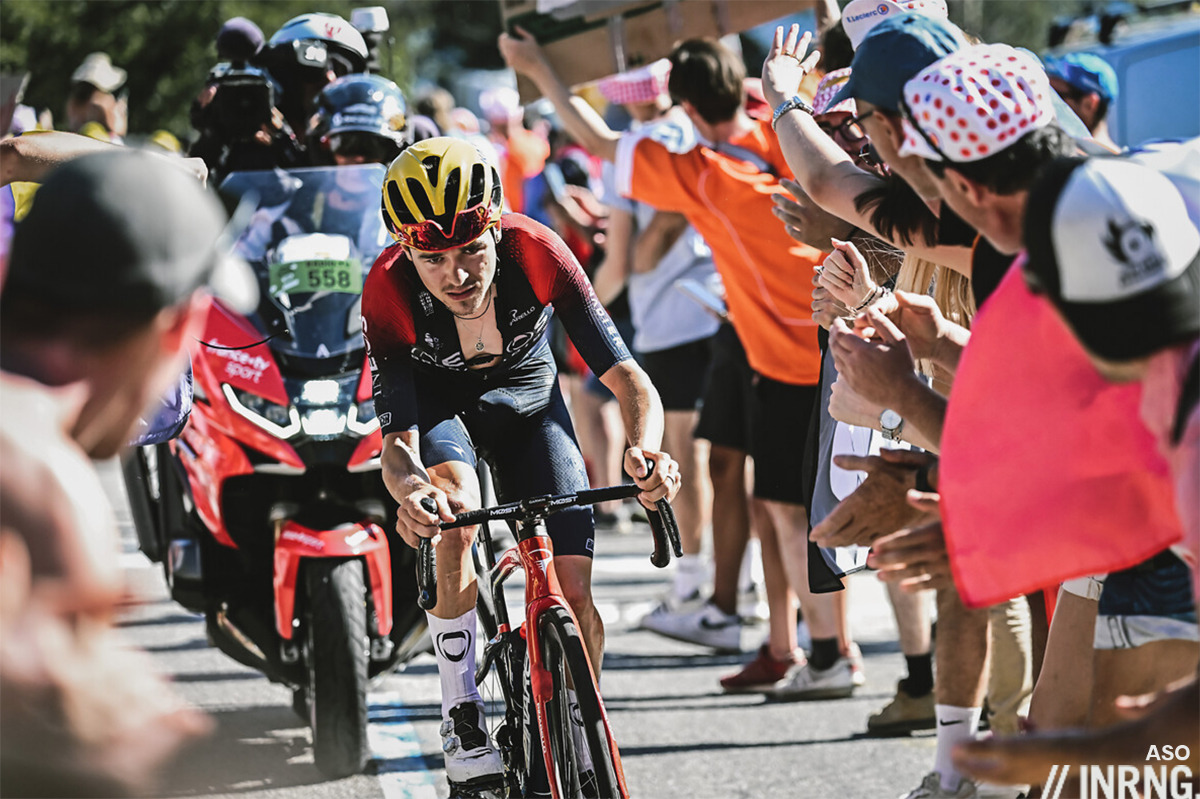
The Alpe d’Huez stage saw a win for Tom Pidcock who’d bridged across to the breakaway via a telegenic descent of the Col du Galibier and then rode away in the finish to hold off Louis Meintjes and Chris Froome. Pogačar did attack but couldn’t distance Vingegaard and with the two marking each other Geraint Thomas got back.
All the other GC contenders and pretenders were further back and this was the story for more of the mountain stages: Pogačar attacking, Vingegaard matching, then Geraint Thomas and behind them the others in the top-10 doing their best to limit their losses each day but surrendering time in almost every uphill finish.
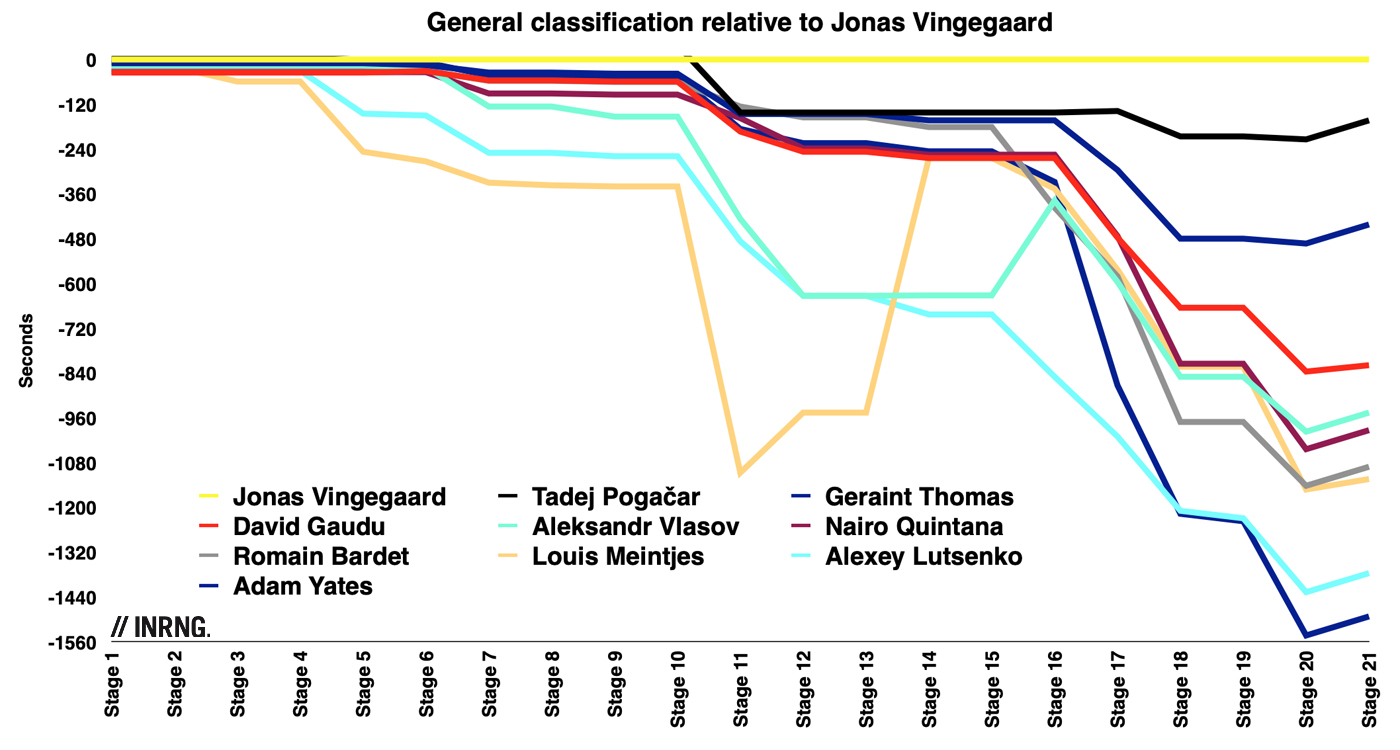
The chart above shows the GC standings of the top-10 relative to Jonas Vingegaard across the three weeks and you can just see Pogačar’s black line is superior in the first week but we’re talking pixels in the chart, seconds in a race that was going to be decided in minutes and difference between first and tenth is the widest since 1997. You can see how these gaps came around, every summit finish and time trial just exploded the gaps, although you can note the breakaway adventures of Louis Meintjes and Aleksandr Vlasov. The only time Vingegaard lost time was when he sat up to celebrate on the Champs-Elysées.
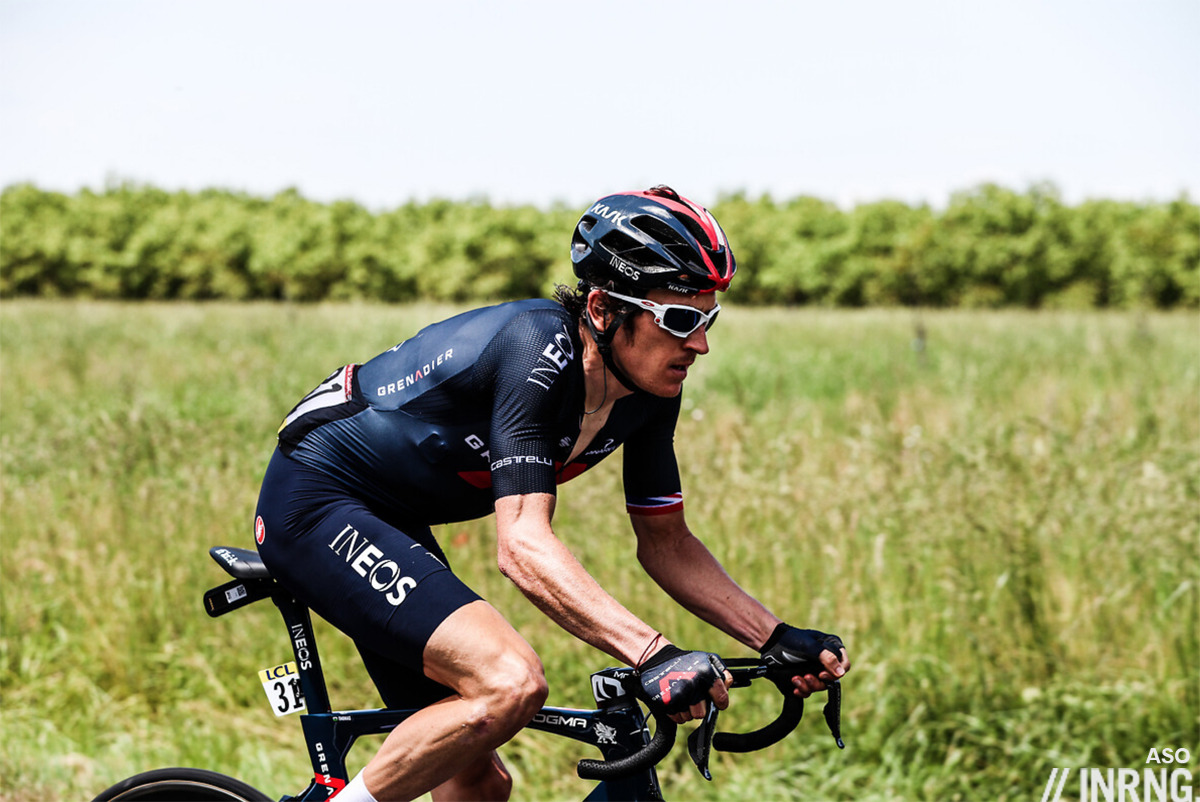
In third place Thomas was at times a Zelig-like figure, appearing in a variety of scenes during the race. Rarely a protagonist – although he did attack in the Pyrenees – he rode his own race, on his own terms and while many others in the top-10 were like yoyos, he was as steady as a Derny on his way to third place overall. His third place overall feels indisputable: there was no way he could finish higher; nor should he finish lower. David Gaudu wasn’t dissimilar, only a touch more volatile on some days when he was dropped and others when he could match Thomas but while Thomas has a Tour win in the bank, Gaudu take experience.
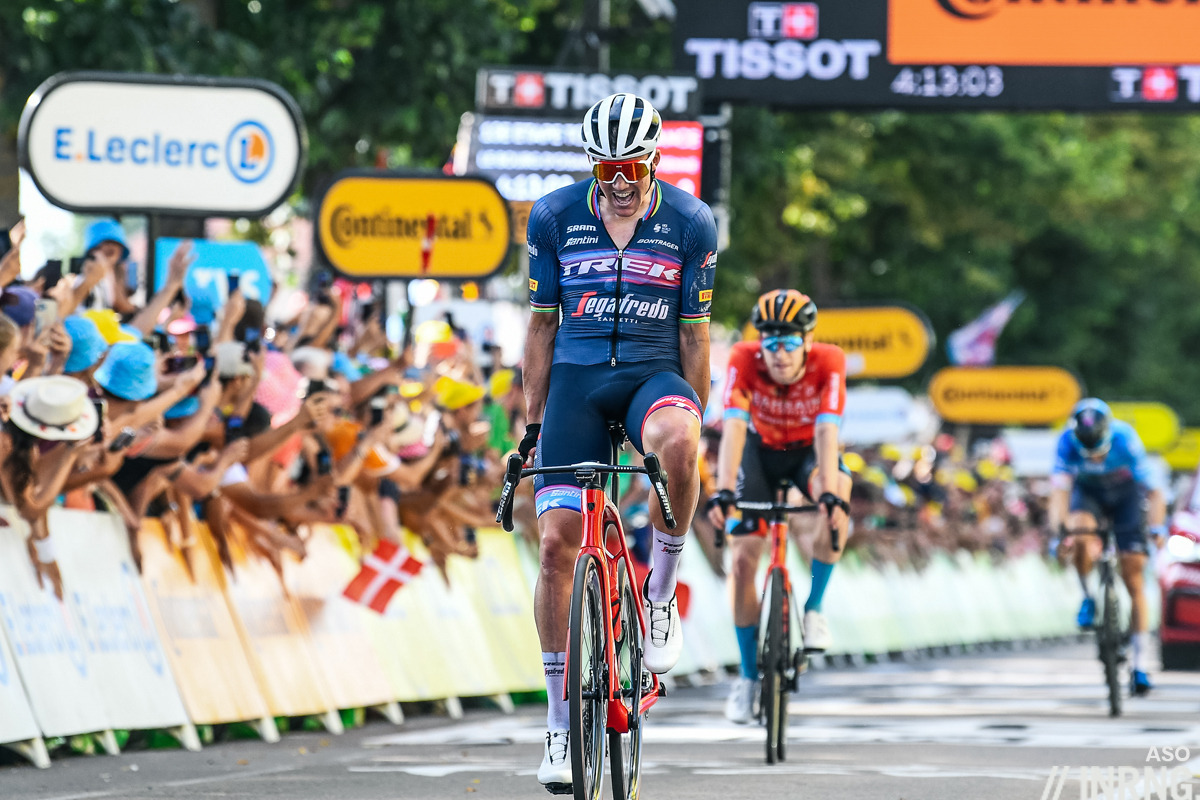
Away from the overall classification, every stage was hard fought. It felt like 21 World Championships where even getting in the breakaway was a win. Teams were deploying dedicated tactics, often an attacking rider needed a leadout to launch them into a move. Trek-Segafredo were exemplary, when Mads Pedersen won in Saint-Etienne it was helped by Quinn Simmons in the breakaway and the American was ever-present windbreak for team mates.
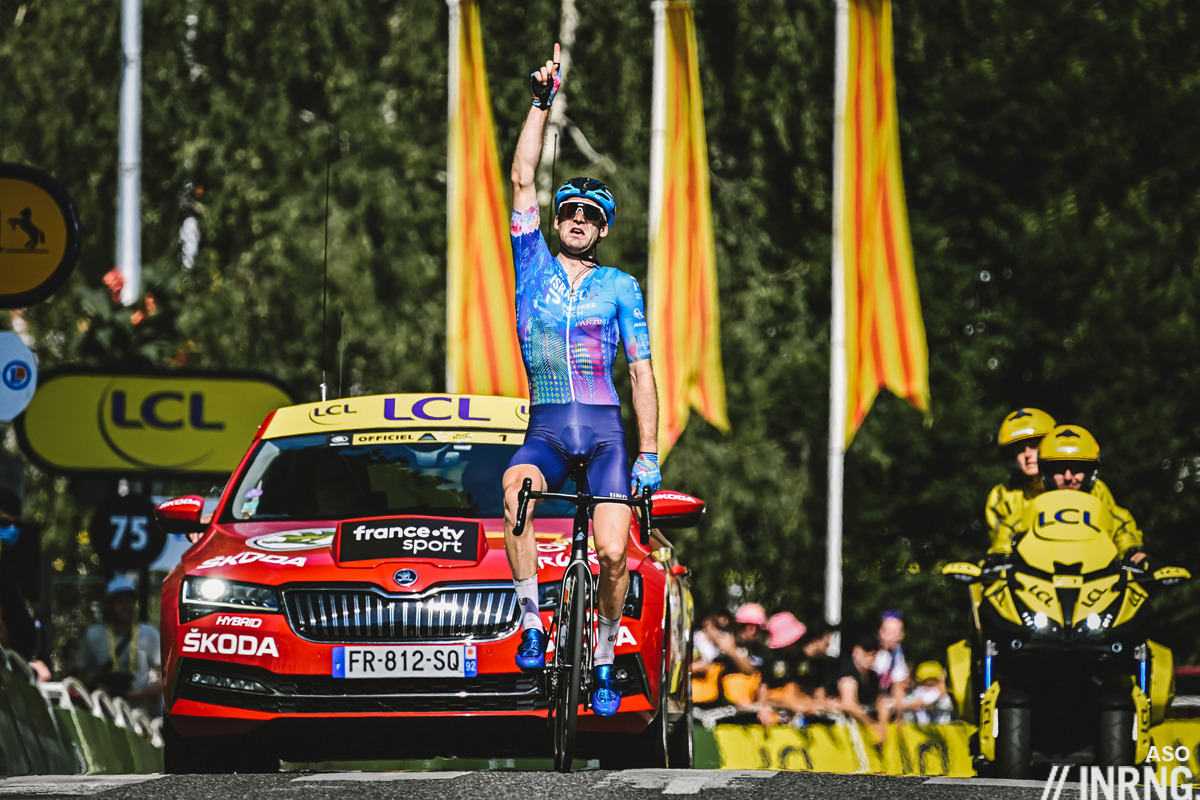
Along with Pedersen, Clarke, Jungels, Cort and Hugo Houle all took fine stage wins and showed there’s room for smaller teams to exist although it took tactics and these were wins for established riders, the chances of some plucky outsider from a wildcard team are dwindling given the intensity of the competition.
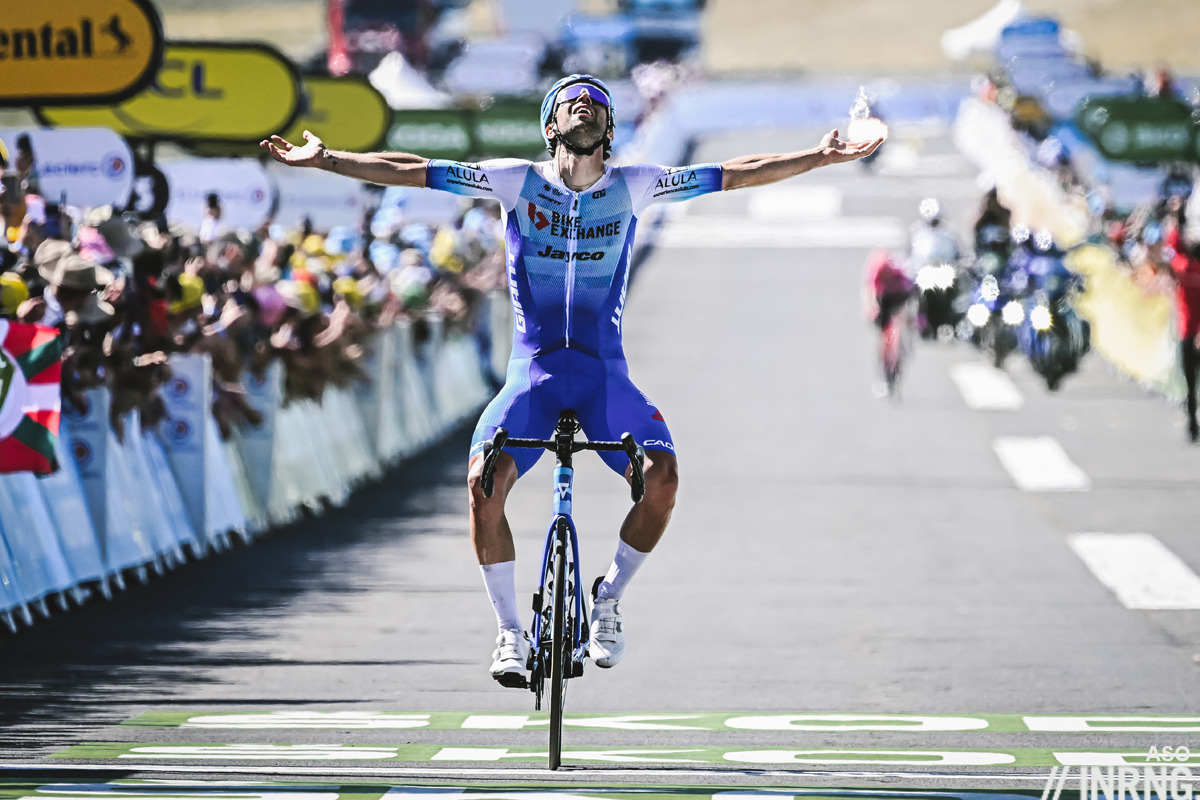
Michael Matthews took a masterpiece stage win on a day when Pogačar was among the early attackers. Wave after wave of attacks were made in the Forez mountains. Cycling is still “two hundred idiots trying to cross a white line” in the words of Marzio Bruseghin but if the rules are not being rewritten, the manual is. The 2022 Tour was one of the shortest routes, it was the fastest ever and the course often seeks out surprises, a sprint stage has a hill in the finish or another twist. The stages are more intense with a bigger battle to get in the breakaway. Gone are the days when a, say, B&B Hotels rider would have to go up the road to provide animation, a euphemism for allowing the TV production to at least have two scenes to cut between. Live TV can make the early move more rewarding. It’s a subject for a fuller blog post but “new” racing is run on a higher octane with riders consuming way more energy mid-stage so they can expend more of it. Above all the Tour de France is so important that every day there’s an opportunity few can afford to miss.
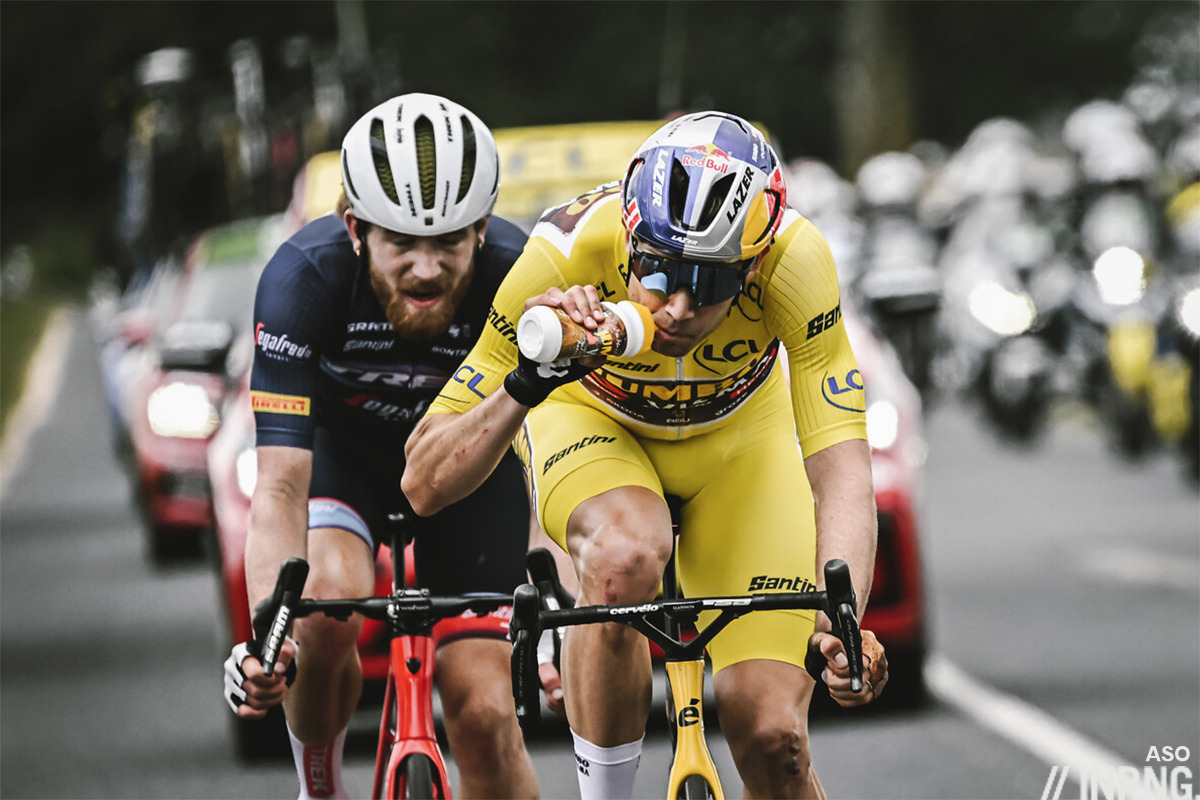
As much as teams could try to create opportunities they were often up against Wout van Aert. A spell in yellow, three stage wins, meeting his objective of winning the green jersey, he made more attacks than Bruce Lee film and enlivened the race. It’s hard to think of a mistake, the Longwy attack didn’t work out but made UAE chase all day; his response in the winners’ press conference to a question about doping when he questioned the question wasn’t a communications masterclass. His own prize money haul from the race probably puts him fifth among the Tour de France prize money standings. Each time you expected him to be tired – think of his fruitless raid on the road to Longwy – he’d keep going. Sprints, time trials and mountain stages, nothing would stop him. After Mont Ventoux last year people wondered where the limits where, his ride to Hautacam has got even more people asking whether he should become a stage racer and a grand tour contender. But surely this would spoil everything? He’d have to race with more economy. It’s inevitable in cycling that no sooner has someone triumphed today than they’re asked they can do tomorrow. The grand tours, in particular the Tour de France, exert a huge financial pull. A classics contender might earn a six figure salary, a grand tour contender will have an extra zero on the end, see Geraint Thomas for a case study. But Van Aert is already in superstar bracket and largely because of what he can do every July. So there’s less of an incentive to make the switch, it depends more on what he feels like doing.
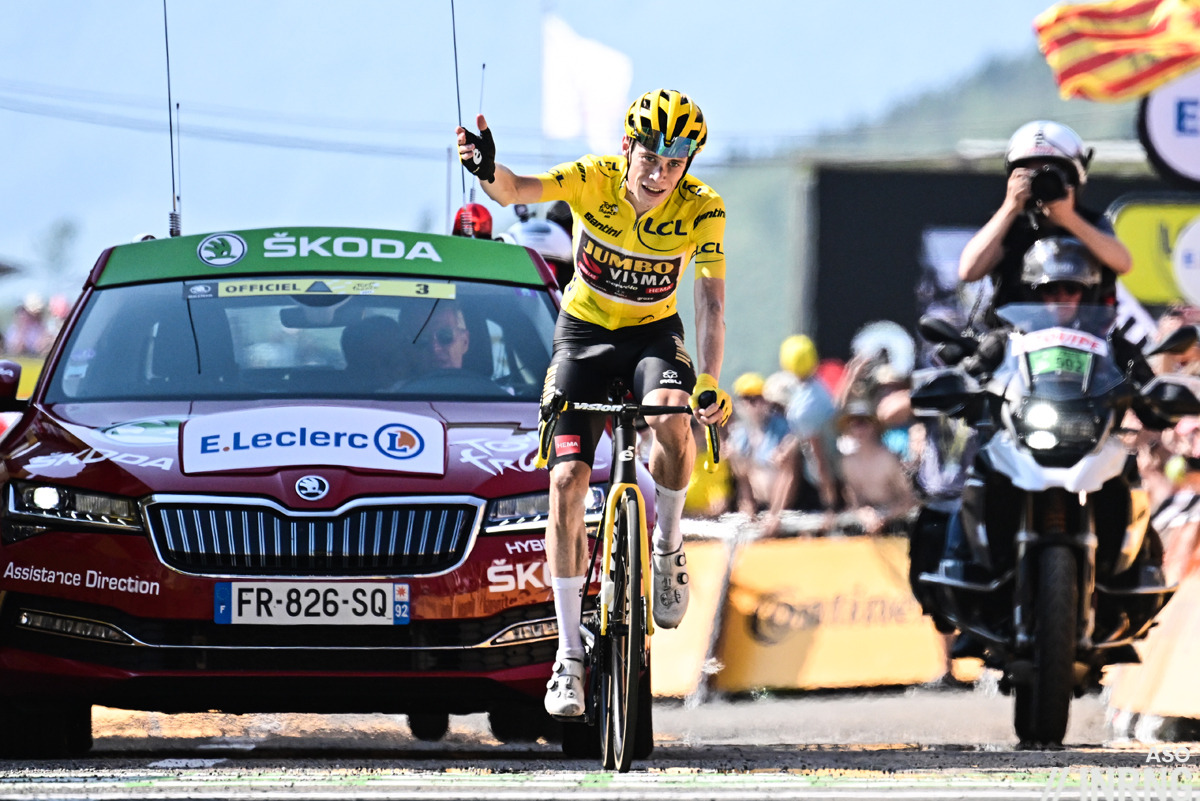
Hautacam showed van Aert in a new light and also Jonas Vingegaard. If Pogačar had cracked on the Granon, this time he was just dropped leaving the Dane to take a stage win in the yellow jersey. In 1997 Telekom won the race overall and the points jersey but their leaders rode quite separate races; this year’s winners combined together, there were times when van Aert’s ambitions seemed like they might clash but the winners get to write history and Vingegaard’s win was in part built by the work done by van Aert on the Wallers-Arenberg stage, had he not got Pogačar back things would have been different, at best for Jumbo-Visma a different path to victory.
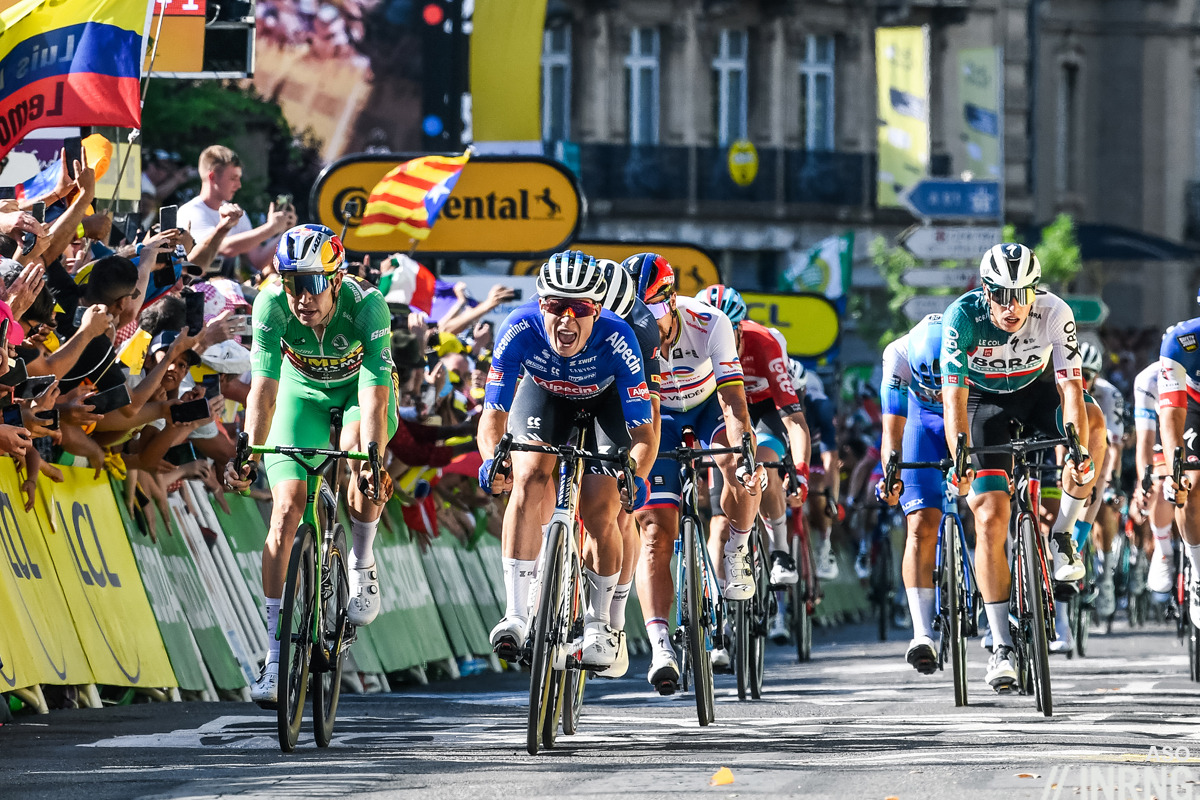
In a race where the sprinters had a rough time, Jasper Philipsen fared best thanks to two stage wins. He’s more than a sprinter, he’s won the hilly Tour du Limousin stage race and can handle the cobbled classics and is likely to be the archetypal sprinter for more Tours as the organisers continue to hunt for obstacles to make sure no day is ever just a procession towards a sprint. This is likely to have a structural impact on the sport: with fewer sprint stages, demand for sprinters will drop.
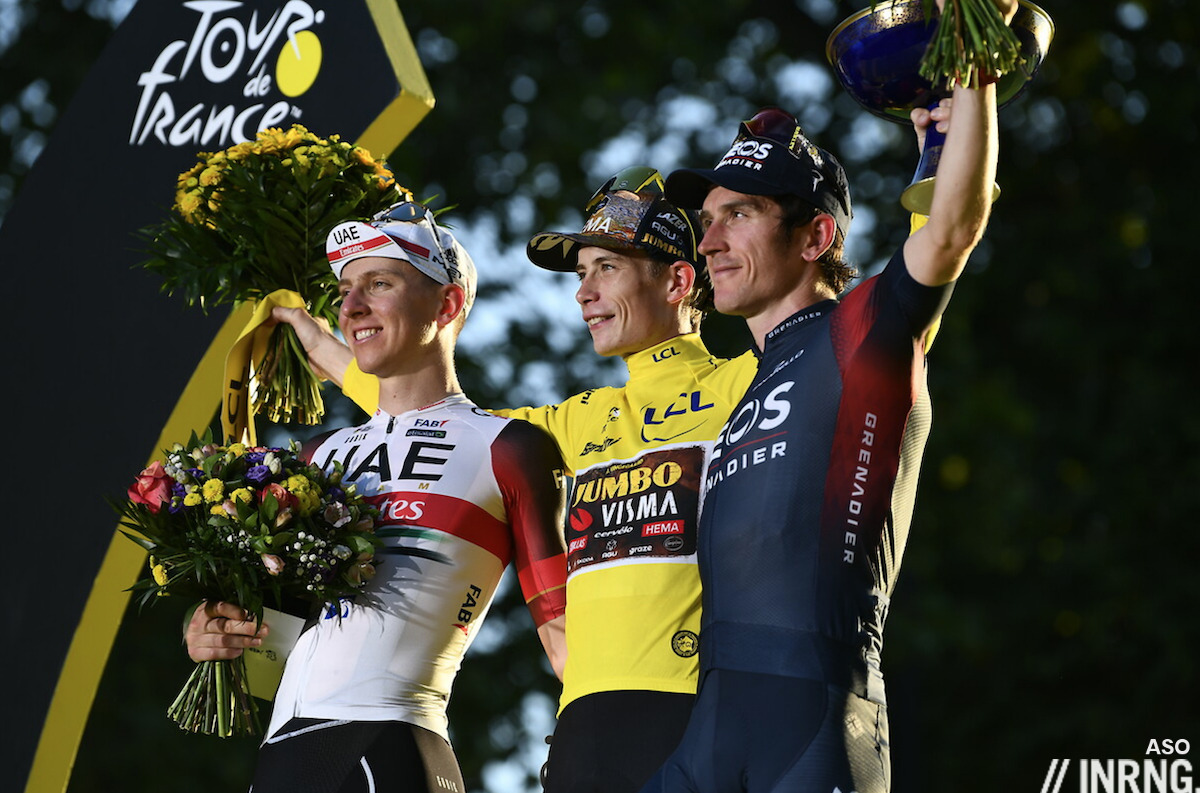
The Verdict
A gripping and enthralling race, there was never a dull day. The yellow jersey was soon reduced to a duel between Pogačar and Vingegaard but their match lasted from the Vosges to the Pyrenees. The pair were scrapping for the stage win atop the Planche des Belles Filles and while Vingegaard won on the Granon, there was always the possibility that Pogačar could turn the tables. Both riders fought directly but only after their teams had gone at each other before. Who needs the promised Netflix documentary when the real thing was so good?
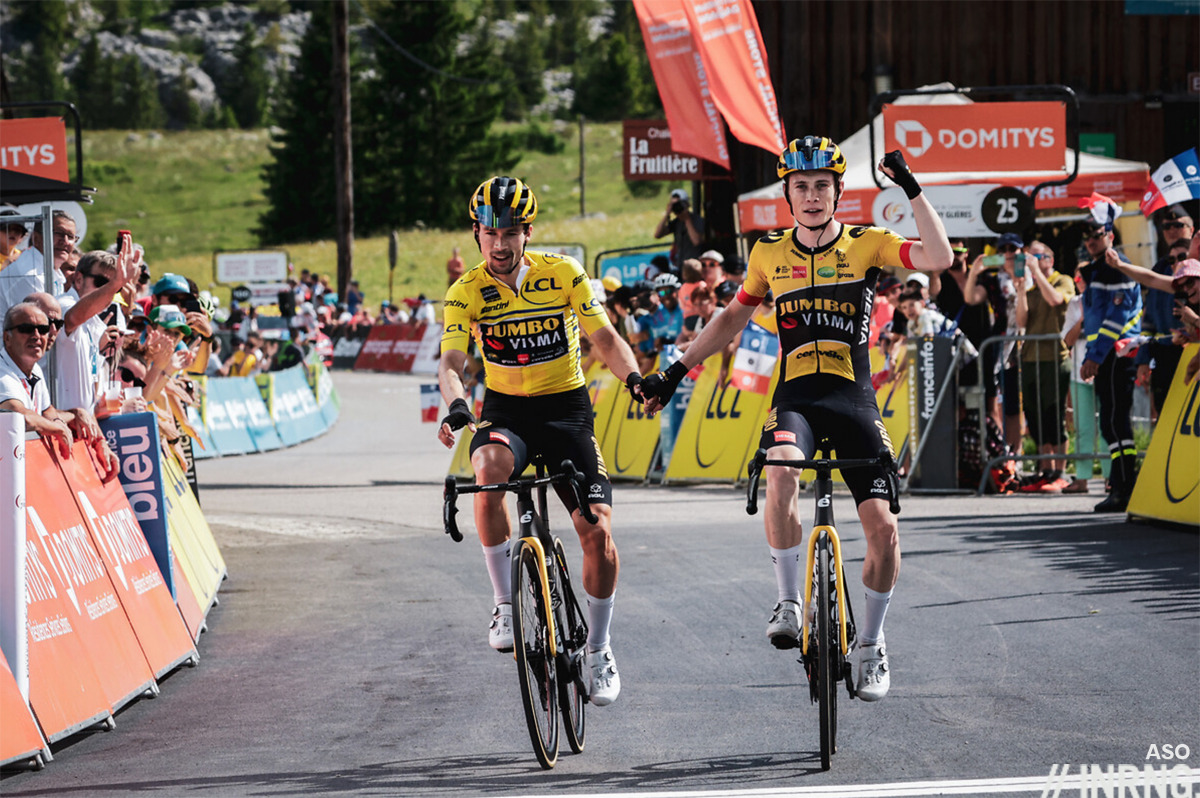
Propelled into team leadership in last summer’s Tour following Roglič’s crash, he wasn’t burdened with expectation on his way to second place. What’s intriguing is that his team sent him straight back to the Tour de France. He could have tried leading in the Vuelta or Giro first, especially as the start in Copenhagen just meant extra pressure for a rider who infamously suffered from stress. But no, he was in for the Tour which suggested Jumbo-Visma had big ambitions and were putting their eggs in July’s basket. It was in the Dauphiné that he gave us a glimpse of what was to come when he seemed visibly stronger than Roglič on the Solaison climb.
Pogačar was clearly beaten but can hope to win the Tour again and in the meantime seems able to target a multitude of races from the pavé to Paris. Vingegaard meanwhile looks like a pure stage racer. He might be hired for an appearance at the UAE Tour or show up at Tirreno-Adriatico but like a BBQ, rosé wine or a Hawaiian shirt he looks more suited to summer. What makes the 2022 Tour de France so thrilling is the feeling that it hasn’t ended, instead it promises the start of a new rivalry with more sport to come.

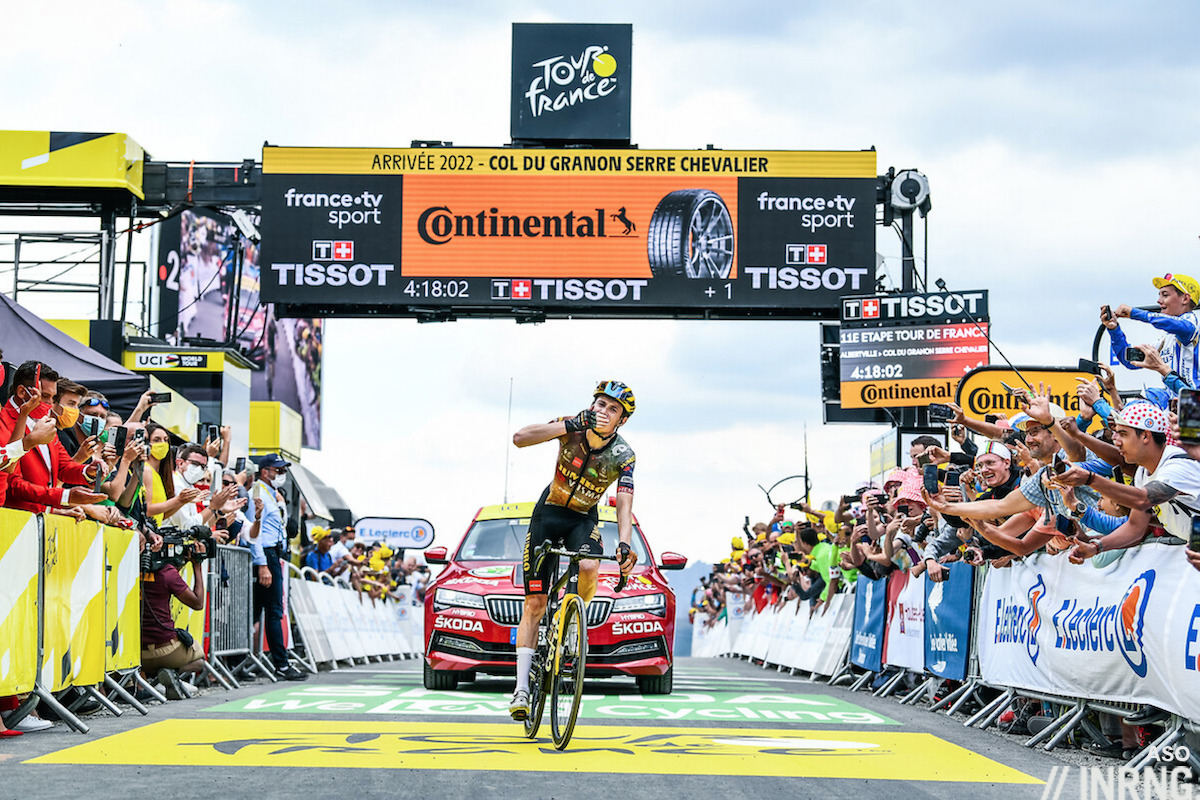
What a fantastic write up…
Always enjoy your content.
An excellent race. Great to see Pogacar and Van Aert doing so much exciting racing, and then Vingegaard proving himself so very strong.
I especially enjoyed the fantastic competitive spirit that was clearly in evidence between Vingegaard and Pogacar. Two racers that respect one another and who’ll hopefully battle out several more grand tours in the coming years.
Thanks for the Tour de Inner Ring! So many great write-ups and previews.
Yes! Fantastic coverage, thank you very much
Superb summary of a memorable tour, thank you
I’m thinking that maybe we see Pogacar go for the Giro next year? He seems to be driven by new adventures and new rewards , he doesn’t have the semi-obligation of being the defending champion and there has been talk of more stages in Slovenia
I really don’t see Pogacar backing down from any future fight with Vingegaard and Jumbo-Visma, he’ll be back all guns blazing.
I totally agree with IR about the Granon stage.
In retrospect, though, the form and range of van Aert made a huge difference.
He was able to nullify any chance of Pogacar attacking on flat / mixed terrain, and that left only the TT and mountains.
What do Team UAE do about this, get a similar rider and another GC threat to match up against the Jumbos?
Van Aert, half man, half machine –
https://www.youtube.com/watch?v=4YJ3BTKMILw
🤣
I can’t see Pogačar at the Giro yet. He’ll surely fancy another go at the Tour and his sponsors, both the UAE airline and the Crown Prince want the number one trophy asset in the sport, the Giro might be the second best stage race going but in their eyes the Tour is what counts for so much. Maybe if he can win several Tours he might try the double.
Bravo, and thank you again. As an aside, I think your summary makes it amply clear why this TdF was the fastest ever. That’s one of the beauties of your writing – evocative as well as edifying.
Three weeks ago my enthusiassm for Pogacar was limited. He seemed to win everywhere with ease and looked set to outdo the records of the cyclist heroes of my distant youth. Now I see he is courageous, dignified in defeat, with a warm smile and apparently appreciated by his peers. It’s pleasing to find another rider to admire.
Good point, it’s in adversity as much as triumph that we can see riders. Pogačar’s fall off the top step is something I wanted to dwell on above but the post was getting long already but it leaves the way for more sport. Roglič, we’ll see. Bernal’s coming back. How will Evenepoel’s Vuelta go? There’s already an open aspect. Not long ago you’d see the new route for the Tour (this year’s one is 27 October) and knew Froome would likely win; it was beginning to feel like the Tour was Pogačar’s property. Now it’s back to a different and more open setting.
Totally agree. Another thing is that he lost his aura of invincibility, which will make the races probably more lively and more difficult for Pogacar. Where before it was: “Let’s see how long we can keep up with Pogi”, now it will be “There’s an 18km climb to 2000 meters and it’s 30 degrees, an excellent day to drop Pogi!”
I think both the yellow and white jersey handled themselves so well and with such sportsmanship, that they both fell like winners in the grand scheme of things. I have no doubt that they are exiting this year’s tour with more fans and respect that they entered it with. If Pog had won a third tour in a row, it would have devalued tour wins for him in a way. Now that he was shown to be human and not invincible, both his past and his potential future tour wins will weight more.
One of the things that make cycling different from other sports is that competition like a grand tour yields so many winners. You have 4 jerseys, team competitions, red numbers and stage winners, GC top 10, GC podium, stage podiums and even an award for reaching the highest point first. And when a rider wins something individually, it’s a win for the whole team. I like this aspect a lot. It’s more like life itself. There isn’t a single winner. There are a bunch of people and teams racing on the same course, but with totally different goals, approaches and expectations and all of those rub against each other. I already can’t wait for next years tour and for the upcoming Vuelta.
Fully agree with your comment. The way Pogaçar rode this tour dignifies it more than if he had won the same way as last year. And also how he behaves in the defeat.
Plus he rides one day races to win them. Even Flanders.
As ever, after years and years of enjoying The Inner Ring, thank you for another superb post.
Zigzactly. Hic!
For some Tours in the past, you’ve often said that the proof in deciding if it was a good race is whether you’d buy the hypothetical DVD afterwards.
While I totally understand your dig at Netflix, this year we actually get the opportunity to watch the race back. While it was an excellent edition in real time, I’m looking forward to seeing the Hollywood version too. A win-win…
They’ve been filming for months so some background could be interesting. But yes, this race passes the DVD test to the point where the editor would have a hard job trying to fit the highlights and the story of the race to one disc.
Excellent coverage of this year’s race. A very special edition, it felt like the racing would never stop even up to the TT
As ever Inrng provides not only the most insightful analysis of bike racing but beautifully crafted and knowledgeable prose. How you find the time to do all this I dont know but thankful that you do.
It seems to me that bike racing has undergone a change like football went through about 10 years ago with “tiki taka” in Barcelona and “Gegenpressing” in Germany. Like then it has left those sticking to the old script scratching their heads that tactics that worked for years no longer do. No doubt it helps having a generational talent (Messi = WvA) but there has been a change of approach which has brought success. I am not convinced it actually brings better racing (there is something majestic about a TdF sprint, a bunch of alpha males duking it out in a testosterone fueled high speed show down) and things are lost in the pursuit of “exciting racing” from the moment the flag drops. However the race is paid for by the television coverage not the crowds on the sides of the road, coverage of every stage from the start demands more than tourist shots as the peloton ambles through the sunflower fields.
I was struck at the time that for all of Tadej Pogacer’s efforts in the first 10 stages he only had a small lead, all that effort for such a small reward, being 1 – 0 up at half time simply wasnt enough. He paid for for that careless expenditure of energy on the slopes of the Granon, JV had worked out his weak spot and ruthlessly exploited it. It left him looking the inexperienced rider he is, not a two time tour winner. The contrast with Geraint Thomas was instructive, in what was probably his finest ride around France, he was focused on getting the highest possible finish he could, happy within himself whilst proving a point to his team management in an emphatic fashion. A last flowering of a “golden generation” of British cycling?
The challenge for Jumbo Visma is how they repeat their success in the future and keep all their riders happy, the challenge for the other teams is how they improve and plot a route to winning next time.
Another question to ponder is whether Primoz Roglic will ever win the TdF. Another chance has gone by, is he still the number one rider at JV? Will he have to move teams to take the leading role (there are apparently rumours about a move to Ineos though that makes little sense to me).
I don’t think that the first week’s effort necessarily went against Pogacar though?
His relatively slender lead felt more like a widening gulf at the time and another minute or more could easily have been added to that lead were it not for van Aert rescuing the pave stage.
A minute and a half, say, at that point would have been a fair reflection of how well Pogacar was riding.
I already admired Pogacar very much but now more so in defeat, and I’m intrigued as to how he’ll strike back.
That’s the point, Tadej Pogacer put all that effort in for little reward. If he had managed to get a 1.5 – 2 minute lead it would have been a different matter. With the exception of the cobbles stage significant time gains were unlikely during the first 10 stages. A more mature strategy would have been to conserve energy for the key moments. As others have pointed out TP often races as if it were an U23 race (which I believe he would still qualify for) often fun to watch but not necessarily the best way to win. It is the strategy Jonas Vinegegaard followed, beyond some messing with TP’s head he chose his moments to expend serious energy with care.
Pog rode aggressively, but how else to get a gap. When you attack, you don’t know in advance whether you would succeed or not. You attack, because you believe you have the strength to and you want to take advantage of the opportunity. However, you can’t know if your attack will be successful in advance. You throw the dice and let the legs decide.
Vingegaard’s attacks were more successful because he was stronger and had stronger teammates.
Very true. Also when Pog attacked there was a queue of Jumbo riders other than Jonas ready and willing to ride hard to bring him back. In this race Pog was having to do the work himself. It meant he didn’t have anything left to follow Jonas’ full send on Granon or Hautacam.
Roglic recently signed a contract extension until 2025. The only way he would leave is if his contract has a buyout clause (and then only if there were a team willing to pay it).
It was a great tour to watch and as ever I greatly enjoyed your writing, which is unmatched both in style and in substance. The race may vary in quality over the years but INRNG always delivers. Thank you!
Excellent overview as always.
A bit tongue and cheek, JV won the race as a result of two events. The day Jumbo announced Wout was included in the TDF squad and the day Roglic quite the tour.
“… the day Roglic quite the tour…”
That is harsh.
Both 2021 & 2022 he’s had bad crashes early in TdF that led to withdrawals & DNF. He’s had an unfortunate ability to be in the wrong place at the wrong time.
Tom, I’m not being critical here but Roglics withdrawal presented a situation that Jumbo would have a single leader to support and be focused to that end. Given that Jumbo resources were becoming limited with DNF’s.
But Jumbo we’re already focussed on a single leader at that point? It was Roglic’s sacrifice on the Granon stage that helped propel Vingegaard into Yellow, and his abandon will have surely hurt the team just as much as that of Kruisjwijk?
Great summary of a great tour. My memory is terrible but I feel this one will last. Completely agree with the last lines about the tour feeling over but the start of a new rivalry but my hope would be for it to be more than a dual between 2 individuals for the win. I also think there’s a shift in the balance of the teams. Astana and Movistar were almost anonymous. Ineos no longer the dominant Death Star casting a shadow over the entire race. Lastly a chapeau to Fred Wright who’s really had a breakthrough season and a fantastic tour – just a shame he couldn’t find the win but it seems just a question of time now. We always look forward to the next tour but in 2023 even more so than usual.
Roglic could have stayed to help Vingegaard keep yellow and it would have made JV stronger, not weaker.
Roglic was riding with two fractured vertebre after his crash. Even if Jonas had lost, pulling Rogla from the race was probably the right choice for his long term health and performance.
We’ve seen a few riders over the past couple years miss a year or more because they pushed through back injuries in races where they had no business still being there. It would be a massive shame, at the absolute least, for Roglic to miss what remains of his prime because he tried to push through (especially when it was clearly affecting his performance more and more as time went on)
If Roglic had not crashed and been injured, Vingegaard may not have won the tour!
So the part where Roglic carries on to help the Jumbo cause by being one of two to repeatedly attack Pogacar just doesn’t count in your view? He played an integral part in doing the damage before he quit.
Fantastic right up as always, many thanks, I’ll buy the dvd.
Seems to me this tour is an example of form and feel driving tactics rather than big data and team hierarchy… especially in those hard to predict breakaway winners and their breakaway partners like the ever present Fred Wright and Simmonds +++. You can imagine a chat at breakfast each day ‘so who’s feeling great and up for emptying the tank today?’
Muchas gracias Inner Ring.
Concerning nicknames. In ESPN south América the commenters named Vingegaard ” my poor little ángel” . The nickname comes from the actor of the move “home alone 1”. Sorry Larry T but I think It is better than yours
“Home Alone (titulada Solo en casa en España y Mi pobre angelito en Hispanoamérica) “. I get this part of it, but are we supposed to see a resemblance between Jonas Vingegaard and Macaulay Culkin? Or did the commentators see Vingegaard’s position in the race as somehow comparable to a boy who defends his family’s home?!
But even though I don’t wholly get it, I think I like it and I wouldn’t mind if it sticks – and I certainly prefer it to “Vinny” 🙂
I’ve read that within his team he is also known as “The Fisherman”, because he worked in a fish factory. “New guys” tend to get nicknames, but I’m not too sure this was a long-lived one.
Regarding Vingegaard’s “freak” qualities: in July 2018 – that is, during his second season in the Danish Continental team ColoQuick – he, along with other riders in the Danish U23 team, went through the usual physiological testing protocol and his values were quite exceptional.
So high, in fact, that it became news with the headline “Danish talent with a special heart blows up test records” and the quote from his coach “If he continues to develop, he can go a long way. As in really, really long.”
The 21-year old rider was quoted as well: “My first dream is to become a pro rider and deep inside I have the dream of one day winning the Tour de France.” 🙂
Famously, he was noticed by J-V for his KOM in 2018 up the Col de Rates beating Tejay’s with 11″. Video here: https://www.facebook.com/coloQuickCycling/videos/rekord-p%C3%A5-coll-de-rates/1559741520809906/
The cited working at a fish factory story is correct in as much as it was a job his team (ColoQuick) provided for him in order to get a better structure in his daily training regime. His DS something along the lines of: “If he didn’t have this job getting him out of bed, he rarely would get any training done until late afternoon.”
btw the Col de Rates KOM is currently held by the Danish UnoX-rider Jacob Hindsgaul
Yes, we are supposed to see a resemblance 😉😉
Thank you for this brilliant write-up, and all the coverage during the race too. We’re lucky to have you, just like the spectacle of the race itself.
The quality of the writing and the depth of knowledge from INRNG never fails to impress. I’ve been reading your posts for many years and it is a small joy to check the site around 9 pm California time and see a new article, fresh, without comments as if written for me alone.
I know cycling for many of us is a refuge from the headlines of the day, but perhaps you would comment how you see climate change affecting racing and the sport. While the aggressiveness of the riders this year was thrilling, it was depressing to see most of the TDF run in 30-40 degree temps with both the riders and fans sweltering.
We are 1.5 deg below average here at the bottom of the world … a chilly winter with the best snow in decades. I can only assume that the northern hemisphere is sucking up heat from the southern hemisphere!
I guess now’s your chance to try biking (preferably MTB) in the snow? In my humble good snow is my absolutely favorite surface to ride on.
Thanks for the excellent write-ups, as always. One point for discussion is whether there is a bit of post hoc justification in questioning Pogacar’s early race efforts? There have been enough recent GTs decided by seconds (or nearly, such as this year’s Giro until the final mountain) that bonuses here and there seems a legit strategy. If (and perhaps a big if) Pogacar simply bonked on Granon due to poor fuelling and would otherwise have not been dropped, then the final gaps would be tiny and we could be praising his efforts for bonus seconds.
I’m still curious to see what WVA does next with stage racing – if Thomas could make the transformation then WVA definitely can, especially if stage races continue to mix it up with classic-like stages. Perhaps Paris-Nice or something similar first? Secretly hoping for a combo event where WVA, Pidcock and MVDP compete over a multi-discipline stage race (cross, MTB, cobbles, mountain, sprint)…
Would Wout want to sacrifice at least 1 Classics season to lose the weight and target the Tour? Maybe if ASO were to announce a 2012 style route, it would trigger some interest.
FWIW I believe a 2022 Wout could easily have challenged Wiggins for 2012 Tour.
Pogacar has more monuments than WVA and has shown he can be competitive in the cobbled classics he’s competed in, so I’d say that this generation shouldn’t be too worried about specialisation. Imagine WVA would lose a bit of top end sprinting power, but he might be ok with that.
I definitely hope that if wva goes for a GC, he does it his way: being an attacking and multi terrain rider. Not staying quiet in the bunch waiting for the itt and matching others in mountains. Not preparing exclusively the tour.
But it is probably too big a ask to win a tour then.
WVA, Pidcock and MVDP competing over a multi-discipline stage race sounds amazing. You can also throw in Pogacar and Sagan and a few of the XC guys like Nino Schurter, Fluckiger and Daskalu and a few more wild cards from the road. Unfortunately, highly unlikely if not outright impossible.
Maybe they could do something like that for the women first. A higher percentage of the female cycling stars are multidisciplinary and their calendar can handle more new outside-the-box events and something different might spark some additional interest.
What Ben F said. Form and feel driving tactics is what I got from this TdF. JV going in with a plan but reacting to what the road and other teams threw at them. What a wonderful TdF, enjoyed the fact there were fewer pure sprint stages, a TTT stage would not be a bad thing though. I have always enjoyed watching the team work and harmony required to get that right.
Genuine question to the readership – does anyone see Bernal coming back from his crash as a contender? I have no strong opinion, curious for those with more knowledge than I have about recoveries.
I have no more knowledge than anyone else, and far less than some of the extraordinarily knowledgeable folks here. But I think Bernal will not win another Grand Tour. At very best, he might be on the podium of shorter stage races, so maybe in that sense he could be considered a contender.
He can win Giro and Vuelta if he gets back to pre-crash level. Question is whether he/Ineos wants to do that. I guess he can start off with collecting a set of all three GTs.
Truth is Bernal is very attacking and can be competitive in many monuments. Once he collected his sets, he can follow the path of Nibali and be extremely successful without necessarily gunning for the Tour and sacrificing everything else. I guess it is his choice on whether to do that.
That said, I guess he would also want a tilt against the top two. If he can mix it up, all the better for fans.
In terms of his climbing ability, Lantern did some interesting analysis. His W/kg wasn’t very extreme. However, it would be a different picture putting altitude into play. Apparently none had produced similar W/kgs at the same high attitude he did. So he would need long high mountain passes.
In the mountains I think he risks becoming similar to Nairo in that he is there but unable to react to the pure favourites when they go.
In the TT he isn’t as strong as Pog, Rog, Jonas…
I think fighting for podium is realistic. Assuming that Roglic is aging out and Pog and Jonas will be in a league of their own for a while.
I’m not sure that Bernal, at his best but without the dominant Sky/Ineos of the past, would be at the same level as Jonas and Pogi. But I agree with others that I expect him to be back to competing for podiums, and we all know that weird things happen in GT’s and the best rider doesn’t always win.
I think with Bernal, the answer lies less with him and more with the team. Riders generally don’t win the Tour without a strong team and Ineos aren’t the strongest or even second strongest any more – they struggle to affect the race now and certainly can’t strangle it like they did in the Froome era of dominance. So unless that changes, there’s not a big chance of Bernal winning yellow again (even if there are 5 stage finishes at 3,000 metres).
My impression, and that is all that I claim it to be, is that Vingegaard has the superior leg strength/endurance (relative to his weight at least) but that Pogacar had the superior leg speed / faster finishes. I think that means that Pogacar can rebound if he changes his tactics and is more patient.
For me the highlight was Pidcock’s descent and I don’t have to ponder whether peds had anything to do with that.
Congrats to Jonas. The better/stronger man and team won.
Pog and UAE need to find a better director for next year. Allan Peiper out of the car showed. Pog raced like an untethered junior. If I were Pog I would go get Bruyneel. Ban and all that won’t happen but he needs a stronger, savvy leader.
UAE ‘s current roster will not be strong enough to fend off a strong(er) Jumbo Visma, and possibly a stacked 2023 Ineos.
The emergence of Remco makes you wonder if Quickstep would/will ever go with a GC focused squad to the Tour? Those sprint victories seem easier to manage than a Yellow Jersey run….
As a Yankee – glad to see the USA put 7 riders in to breaks, lead yellow jersey contenders and overall make a presence at the Tour in some time.
Enjoyed this article and especially the suggestion to follow Tour Radio. It made the race so much more interesting than the TV broadcasts.
Chapeau mon amie.
Nice to see 4 US kids finish in the top 21 places in TDF GC.
More than any other flag. That is promising!
13 Neilson Powless
18 Sepp Kuss
20 Brandon McNulty
21 Matteo Jorgenson
While the above four are all promising – and Sepp Kuss who has been promising for quite some time now is still promising *more* – I don’t think I’m alone in seeing a rider a little lower in the GC as the most promising “US kid”:
67 Quinn Simmons
PS One of the big small moments of this year’s Tour was seeing Simmons after he had shaved his beard 🙂
Is QS still a rabid Trump/MAGA nutcase? Very hard to like him despite his talent.
No idea.
I have the same attitude towards athletes – cyclists, cross-country skiers, football players – as I have towards authors or film directors: I don’t care or even pay any attention to their politics, their personal life or their opinions on anything outside their particular field.
One of my favourite authors was a fascist and I would never vote for the party a film maker whose work I admire has chosen to publicly give his support to – and a skier who is one of my all-time favourites has said so many dumb things on so many subjects that I would’ve lost count if I had tried to keep a list.
Great point. There are too many interesting riders to waste time on Trumper-MAGA types that are childish. I don’t wish him ill, but I also don’t care to follow him or cheer him on if he’s going to be a jerk.
OTOH, he was a 19 y/o neo-pro when he made the tweets in question. I shudder to think what friends and family would think of me now if I was judged as an adult by some of the many idiotic things I said and did at 19, especially when it comes to politics.
“If I were Pog I would go get Bruyneel.”
I think that’s the weirdest suggestion I’ve heard for a long time! Would you suggest that nice Dr. Ferrari as a team doctor as well? The last thing any of this generation of riders needs is to be associated with an unrepentant dick who was at least as complicit as Armstrong.
Because the folks behind Saunier Duval who now run UAE just aren’t cutting it??
Pogacar is fine – but he cannot afford to allow himself to be isolated like that again. Team needs to have a rethink, as even if the full team of UAE were still present, I don’t think it would prevent what happened on Stage 11.
It takes years to build a team, UAE are trying but you have to remember JVisma are the strongest team ever to ride together in the TourDeFrance, with only Sky2012, Astana09 and LeVieEnClair86 really competing – however good the management are at UAE they have an incredibly hard brief and it’s all too easy to criticise when no obvious solution will be immediate.
The interesting thing is Jumbo-Visma are still building, they will be hiring more big names and GC contenders to act as support riders, as Sky did in the past. So UAE have their work cut out, you’d say they could do with one or two support signings already just to improve but they might need to make these bigger ones.
UAE has a benevolent sponsor who supposedly spent for supporting talent.
But that talent didn’t show or control much of the race for arguably the strongest GC rider.
Agreed they need to sign talent. Pog could have 8-10 more years of GC opportunities.
Renault elf took 10stages and the overall gc in one of fignons years (can’t remember if it was 83or 84) which is a pretty impressive team performance.
Steven, I personally believe the strongest GC rider actually won.
Nobody cares about such suggestions, since Bruynell is banned for lifetime. You could also suggest Pogacar should buy himself a unicorn.
I really enjoyed that Jonas waited up for Tadej when the latter had his little spill on the downhill. Seems like such gestures are more and more rare in modern bike racing.
+1The highlights of the entre tour
+2!!
If Granon was the moment the race was won, then the handshake was the moment it was all over.
Agree, Vingegaard had no doubt when he did that. A sporting move. But had the lead been 20-40 seconds then certainly he would have pressed on.
Yeah, it was a wonderful gesture, but I also believe Jonas knew when he did it that he had the legs to drop him (or at least go with him) on the home stretch so it was a safe choice as well as a sporting one.
Inrng,
Thanks again for the fantastic, writeups, including all the details from pre-riding the stages – most excellent.
I truly enjoyed the TDF.
In my mind, if UAE had all their riders for the entire tour, it might have been even more thrilling, not sure if it would have affected the ultimate winner.
Apologies for posting my comment as a reply above. One further thing to add is I’m all for the reduction/negation of “pure” bunch sprints. They are dull to watch bar the last 5-10 minutes and never affect the GC beyond unfortunate crashes.
But a Grand Tour is so much more than the battle for GC!
Sprint stages are great – as long as they are raced in the “new normal” way, i.e. with serious all-out efforts and tactical plans to win the stage in a breakaway. The thrill of watching the fight between the peloton and the breakaway and seeing the odds rise or fall is something I find quite sufficient for my viewing pleasure.
And although I vastly prefer puncheur type riders to pure sprinters, I cannot help admiring their particular skills and abilities. Or those of their lead-out men.
‘It has happened that I have watched the last 5-10 minutes several times 🙂
Like you say, I like watching a sprint, but where it is an open race…
Will they catch the break; Will there be a flyer at 3km, 2km, 1km to go; Can someone unleash a long 300m sprint; Is there a drag to the line meaning you need to sit in to 150m to go; Has there been some attrition to the stage meaning that riders who rode/positioned/climbed/fuelled poorly will be more fatigued etc
Not just a long flat stage where they average 180w for 4 hours chasing a 4 man pro-conti break before 3 big teams have 7 man lead-outs for the last 5km.
And the 3 guys who compete for the win on those stages get dropped on any old roller mid-stage and are dangling in front of the broom wagon all mountain stages.
Lotto Soudal for example – They had Kron and Vermeersch, I’d have much more preferred to see them given more free reign to animate stages and contest wins, and crucially, open designed stages to encourage that type of race/final.
Dan, I totally agree about the doomed pro conti breakaways where everyone agrees to let them dangle until the 10k banner. Those stages just make me grateful for the dvr. On the other hand, I love the “new racing” with monster rouleurs in the break busting the sprinters’ teams to bits. Almost makes me like Quinn Simmons.
Thanks for a great write up and for all the coverage over the last three weeks, I always knew what to read to start my day.
Thank you Inrng, for your incredible coverage of cycling. For someone who became interested in cycling rather late, your posts provide so much intricate knowledge of the sport and allow to enjoy it that much more. Thank you!
A heartfelt thanks to our host for the superb Tour coverage. The daily reviews/previews/chainring selections have become an indispensable & integral part of the 3 week experience. Chapeau!
Just checking in to leave a heartfelt thank you to Mr INRNG for the coverage. Reading the posts in the morning with an espresso has become part of my morning routine. Just 339 days left before the next grand départ …
…and just hree weels (and a few days) before la Gran Partida in Utrecht!
To me it doesn’t matter that we won’t see Vingegaard, Pogacar, Thomas or, for that matter, Bernal, it’s still the Vuelta – and although the Vuelta isn’t the Tour, it’s still one of the Grandes Vueltas!
The best part of being a cycling fan and a TV spectator instead of a pro cyclist or a local roadside fan is that one doesn’t have to concentrate on one GT. One can follow all three with equal enthusiasm!
And I remember some Vueltas that were very good. in recent years: the fuente dé stage; aru and dumoulin; kontador and froome after their crash in the tour.
(To be honnest we have also had cobo’s and horner’s to compensate)
I think the recent Vueltas have had much more interest than the TdF, with many interesting subplots. I think the “last chance saloon” aspect makes it a lot of fun to watch, with teams and riders fatigued but desperate for a result. This year, however, it would take one hell of a Vuelta to match the TdF. Here’s hoping it happens!
Bruyneel! Good God, heaven forbid.
UAE need to recruit some better super-doms if possible but I’m wishing my life away in anticipation of next year’s Tour already.
Chapeau Mr Inrng
Superb write up. Brings the drama and spectacle back wonderfully. Already excited about the next edition. Chapeau to you and thank you again!
Anyone elso notice how there has been NO mention of the TT stages in any of the above?! They bring nothing positive to GT racing except as an early sort out for GC purposes.
Serious suggestion to ASO and RCS: Please, no TT stages after the first week.
2020? 1989?
They didn’t play much of a role this time but I found them exciting when they’re usually a bit dull asboth were close for the stage win.
Another issue is whether we get a team time trial back any time soon. If we do it’ll surely give Jumbo-Visma an instant advantage over UAE.
Eh?! Have you forgotten the finale of the 2020 Tour already?
Rubbish! You ignore the recent past. ITTs are indeed integral to Grand Tours.
A fantastic write up as always Inrng!
Testament to how the race was won, my takeaway from this article is how much focus is on Pogačar losing the Tour and Van Aert’s consistency/durability. Jonas had to have the legs and the w/kg to ride away both on Granon and Hautacam; but make no mistake this was a team victory – vingegaard’s wins on the two hardest stages came about by astute tactics how the team could execute the stage to profit from UAE’s lack of strength in depth.
Roglic teasing Pogacar to respond to attacks on the Telegraphe and Galibier was perfect execution of strength in numbers. Tadej looked unbeatable for a week, but even he cannot respond to everything for 3 weeks.
For me, the defining moment on this Tour was when Jonas was in an interview after winning on Granon. Wout came in and shouted Jonas a long way away. Jonas then left the interview to embrace with Wout. It shows the affection between them. Wout is almost like an extrovert bigger brother to the slightly timid Jonas.
It has been a long way for JV since the 2020 defeat. How many of that team were here in Paris this year? Wout feels like the pin that links the two events (well, I guess Kuss was there).
Another similar moment to me, was when Wout at the Hautacam crossed the finish line as the third rider. Fist clenched and letting out a roar of victory.
Since you asked:
2020
Primož Roglič
Amund Grøndahl Jansen
Sepp Kuss
Wout Van Aert
2021
Primož Roglič
Steven Kruijswijk
Sepp Kuss
Wout Van Aert
Jonas Vingegaard
Apparently only Wout and Kuss from that team is in Paris. Roglic is the only other rider on both lineups. Unfortunately he didn’t reach Paris.
It is crazy. You’d thought there would be more continuity between the two lineups. Also made me sad thinking about the retirement of Tony Martin and Tom Dumoulin’s impending retirement at the end of this year.
I want to see the buddy cop comedy about Wout and Jonas where they are played by Channing Tatum and Rory Kulkin.
Just, as ever, thank you. Watching the Tour is immeasurably improved with your insights.
Haven’t had my chance yet to add to the plaudits on all your coverage here. It’s been excellent. It’s too bad I have to wait until I wake up to read each day being based in NA though.
The business of the Tour de France: the podcast below zeroes in on the multi-millionaire octogenarian widow who, together with her two children, has kept a tight grip on the Tour de France despite numerous hostile takeover bids.
https://www.rnz.co.nz/national/programmes/ninetonoon/audio/2018850283/alex-duff-le-fric-the-business-of-the-tour-de-france
Thank you IR for the coverage…it is a must (and very enjoyable) read!
Just wondering if you have any insights on where Mathieu van der Poel‘s ambitions go from here following a successful Giro but a disappointing Tour. I appreciate he had an early season injury but I thought the image of him abandoning while in an attack with VanAert with whom he has become inextricably linked through intense rivalry in cycling cross and the classics was especially interesting given the huge job WVA did in the rest of the race while securing the green jersey for himself.
Outstanding blog, loving your guide to iconic roads to cycle guides.
As strong as he looked in the Giro coming close to a mountain stage win, he was later saying it didn’t go as planned and he was coming up short of his ambitions, a stage win to start but then no more wins even if he helped team mates. Then he got the training in between wrong, going in tired from the Giro and then pushing too hard and came out stale.
Don’t have too much to say that hasn’t been already mentioned, but another great writeup!
Hi Mr Inrng, v good analysis of Pogacar cracking on stage 11.
https://www.bicycling.com/tour-de-france/a40632389/what-happened-to-tadej-pogacar/